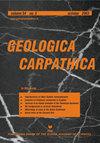乌克兰Chornohora推覆体下白垩统(Barremian-Albian) Shypot组油气潜力
IF 1.5
4区 地球科学
Q4 GEOSCIENCES, MULTIDISCIPLINARY
引用次数: 2
摘要
富含有机质的岩石出现在喀尔巴阡山脉,都发生在下白垩纪和渐新世。尽管人们对渐新世寒冰岩组进行了深入的研究,但对下白垩系岩石的油气潜力却知之甚少。本文利用94个露头样品研究了Chornohora推覆体(乌克兰)Shypot组下部405m厚的层序。下白垩系岩石的成熟度参数表明,所有样品的石油成熟度达到峰值(约0.85%Rr),有机碳含量平均为2.8wt.%。由于成熟度的提高,氢指数(88 mg HC/g TOC)和剩余石油潜力(2 tHC/m2)较低。与来自同一构造单元但成熟度较低的同时代岩石的比较表明,原始石油潜力显著较高(4 tHC/m2)。深埋(6km?)期间可能产生约2 tHC/m2,但在隆起和侵蚀期间损失。Macerals分析揭示了混合型III-II干酪根,以陆源成分为主,附近边缘成熟样品的HI值(~200 mg HC/g TOC)也支持了这一点。整个喀尔巴阡弧沿线都发现了下白垩纪富含有机质的岩石。对喀尔巴阡褶皱冲断带上已发表的年龄等效岩石数据的汇编表明,HI值主要受成熟度和中等高的原始HI值控制。这些岩石中的大多数主要含有III-II型干酪根,而波兰-乌克兰边界附近Skole-Skyba推覆体中的下白垩纪岩石含有(III-)IV型干酪根。本文章由计算机程序翻译,如有差异,请以英文原文为准。
Hydrocarbon potential of the Lower Cretaceous (Barremian–Albian) Shypot Formation in the Chornohora nappe, Ukraine
Organic matter-rich rocks occur in the Carpathians, both in the Lower Cretaceous and Oligocene. Whereas, the Oligocene Menilite Formation has been intensely studied, the hydrocarbon potential of Lower Cretaceous rocks is less well understood. In the present paper a 405 m thick succession of the lower part of the Shypot Formation in the Chornohora nappe (Ukraine) is studied using 94 outcrop samples. Maturity parameters for the Lower Cretaceous rocks indicate peak oil maturity (~0.85 % Rr) and organic carbon content averages 2.8 wt. % for all samples. As a result of the enhanced maturity, the hydrogen index (88 mg HC/g TOC) and the remaining petroleum potential (2 tHC/m2) are low. Comparisons with coeval rocks from the same tectonic unit, but with lower maturity suggest that the original petroleum potential was significantly higher (4 tHC/m2). Probably about 2 tHC/m2 were generated during deep burial (6 km?), but were lost during uplift and erosion. Macerals analysis reveals a mixed type III-II kerogen, with domination of terrigenous components, which is also supported by HI values of nearby marginal mature samples (~200 mg HC/g TOC). Lower Cretaceous organic matter-rich rocks are found along the entire Carpathian arc. A compilation of published data for age-equivalent rocks across the Carpathian Fold-Thrust Belt shows that HI values are mainly controlled by maturity as well as the moderately high original HI values. Most of these rocks contain predominantly type III-II kerogen, whereas Lower Cretaceous rocks in the Skole-Skyba nappe near the Polish–Ukrainian border contain type (III-) IV kerogen.
求助全文
通过发布文献求助,成功后即可免费获取论文全文。
去求助
来源期刊

Geologica Carpathica
地学-地球科学综合
CiteScore
2.40
自引率
23.10%
发文量
26
审稿时长
>12 weeks
期刊介绍:
GEOLOGICA CARPATHICA covers a wide spectrum of geological disciplines including geodynamics, tectonics and structural geology, volcanology, stratigraphy, geochronology and isotopic geology, karstology, geochemistry, mineralogy, petrology, lithology and sedimentology, paleogeography, paleoecology, paleobiology and paleontology, paleomagnetism, magnetostratigraphy and other branches of applied geophysics, economic and environmental geology, experimental and theoretical geoscientific studies. Geologica Carpathica , with its 60 year old tradition, presents high-quality research papers devoted to all aspects not only of the Alpine-Carpathian-Balkanian geoscience but also with adjacent regions originated from the Mediterranean Tethys and its continental foreland. Geologica Carpathica is an Official Journal of the Carpathian-Balkan Geological Association.
 求助内容:
求助内容: 应助结果提醒方式:
应助结果提醒方式:


